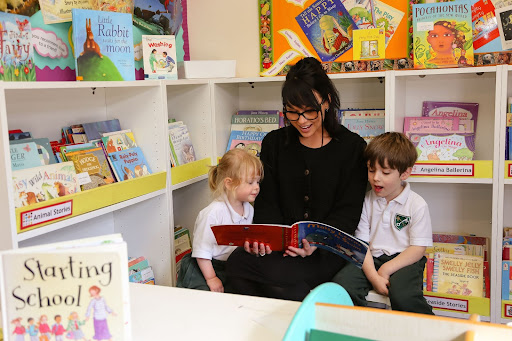Developing an interest in reading from a young age can support your child as they grow, helping them gain confidence in literacy, language, vocabulary and critical thinking. As we get older, it can be easy to take reading as a skill for granted, but it is an essential building block that we should continue to nurture!
As an independent primary school, we know how difficult it can be to encourage good reading habits in children who struggle to read or haven’t yet found the joy in it. Delve into some of our top tips to raise voracious readers and discover the best ways to support those that need a helping hand.
Why is Reading Important for Children?
Aside from obvious educational benefits good reading skills can offer, reading (especially fiction) can also help children develop empathy, support cognitive development and deeper thinking, cultivate creativity and improve concentration.
Stories tend to stick with us, especially those read in childhood, as they inform interests, prompt questions and change the way we see things. Not only does reading help us navigate the world, it can also transport us to new ones.
How to Help a Child Struggling with Reading
While some children may see reading as a fun hobby, others may see it as an extension of school and show little interest in doing it outside (or inside) the classroom. Changing their perspective and encouraging reading at home is the first place to start when looking to support their skills.
- Allow time for reading
- Create a cosy reading space
- Read together
- Integrate reading activities into daily life
- Role model reading
- Let your child choose what they want to read
- Visit the library
- Listen to audio books
- Talk about books and what they’ve learnt
- Bring a book everywhere!

1. Allow Time for Reading
These days, there are so many gadgets and activities competing for your child’s attention, so helping them make time for their reading is important. Carving out a dedicated time for reading is a good way to ensure it becomes a priority.
Building quiet reading time into the daily routine creates a sense of familiarity, showing children reading activities don’t have to be a daunting prospect. Either after school or before their bedtime is a great time for reading, as it can often be calming and provides time to wind down after a hectic day.
2. Create a Reading Space
A cosy spot where your child can snuggle in and read can help boost the relaxing powers of reading. Reading nooks, spots on the sofa or comfortable corners in their bedroom are stress-free zones, helping to take reading out of the realm of homework.
This can help promote reading time as an enjoyable retreat rather than a chore.
3. Read Together
While reading independently is an important skill to develop, it’s also a good idea to sit down and read together. When done with emphasis and in a captivating and interesting manner, reading can be made a fun and interactive activity.
Reading to each other like this can also help your child build confidence when reading aloud to others, reducing worry when they’re asked to speak in class.
4. Integrate Reading into Daily Life
Reading is part of our daily lives, coming in many forms. Highlight this to your child to contextualise what they learn from their reading books.
Ask questions about words or phrases that pop up, connecting them to any new vocabulary or concepts they’ve learnt. Encouraging children to follow along with a recipe and take the lead doing the next steps can be a good way to keep them engaged and sneak in some reading alongside another fun activity.
There are plenty of fun ways to help your child with reading!
5. Be a Reading Role Model
Modelling behaviour is integral to a child’s behaviour – they look up to you, the parent, to see what they should be doing – especially when unsure about something.
If you demonstrate a passion or interest in reading, whether it’s showing them which novels you’re reading or reading newspapers in front of them, they will begin to understand that reading is something to be enjoyed.
6. Let Them Choose What They Want to Read
Providing plenty of choices is another simple way to keep your child engaged. Storybooks are a great way for children to ignite their passion for reading, but there are many other forms which are equally as good for their development.
Comics, magazines, poems and puzzles can all be wonderfully captivating; embrace what your child is drawn to and encourage them to develop an interest in a particular area.
7. Visit the Library Often
Libraries are a reader’s best friend, offering plenty of choice and providing options you might never have discovered on your own. Visiting the library is a budget-friendly way of exploring your child’s interest in reading while also making reading into an event and an exciting trip out.
Most community libraries will also host events, workshops and reading challenges to engage young minds and capture their imagination.

8. Listen to Audio Books
While not reading words on a page, listening to audio books provides another way to absorb a good story, demonstrating the joy of reading and different methods of learning information.
Re-reading favourite audio books in physical form offers another experience, helping your child make new connections and develop a deeper understanding of the written word.
9. Talk About Books & What They’ve Learnt
Encouraging discussion, whether it’s about a particular passage or after finishing a book, can help children develop critical analysis skills and gain an understanding of what they do or don’t like about a book or reading.
Talking about it confirms their understanding of the words, sentences and the story overall, highlighting any areas they might be struggling with.
Discussion also gives you the opportunity to acknowledge their progress. If a child is struggling with a book, you can offer encouragement and help. Or, they may be on the third book of the week, which demonstrates their interest and ability, something worth praising.

10. Bring a Book Everywhere
Always having a book on hand means there’s always something to read! Not only does this stave off boredom at a moment’s notice, but it also shows children reading can be a casual, familiar activity that they can easily participate in throughout the day.
Encouraging reading from a young age can prompt a lifelong love of it while building those core skills that’ll transfer to all aspects of a child’s education. Here at St Peter’s Prep, our school libraries are fully stocked with an exciting range of reading books, ensuring all age groups can develop along their reading journey at their own pace.
To find out more about getting involved with your child’s learning and how to support the development of vital skills, see our advice below.












